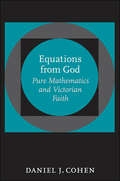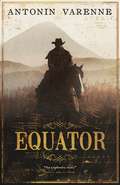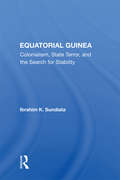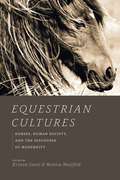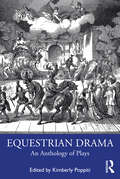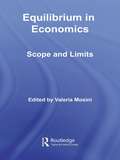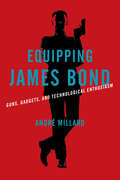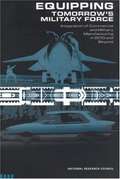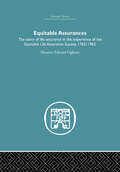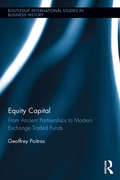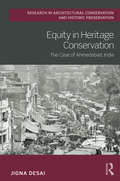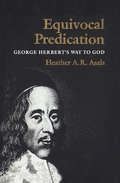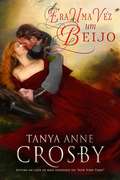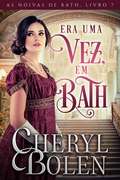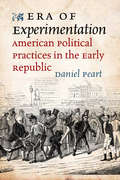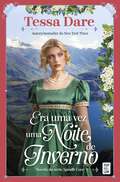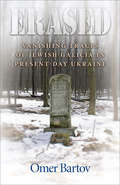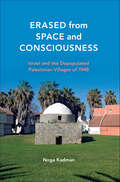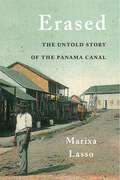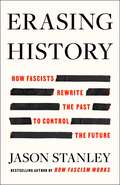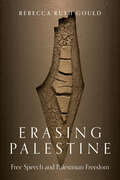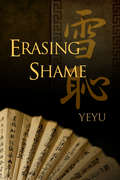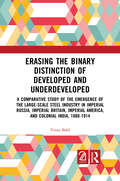- Table View
- List View
Equations from God: Pure Mathematics and Victorian Faith (Johns Hopkins Studies in the History of Technology)
by Daniel J. CohenThis illuminating history explores the complex relationship between mathematics, religious belief, and Victorian culture.Throughout history, application rather than abstraction has been the prominent driving force in mathematics. From the compass and sextant to partial differential equations, mathematical advances were spurred by the desire for better navigation tools, weaponry, and construction methods. But the religious upheaval in Victorian England and the fledgling United States opened the way for the rediscovery of pure mathematics, a tradition rooted in Ancient Greece.In Equations from God, Daniel J. Cohen captures the origins of the rebirth of abstract mathematics in the intellectual quest to rise above common existence and touch the mind of the deity. Using an array of published and private sources, Cohen shows how philosophers and mathematicians seized upon the beautiful simplicity inherent in mathematical laws to reconnect with the divine and traces the route by which the divinely inspired mathematics of the Victorian era begot later secular philosophies.
Equator
by Antonin Varenne1871. Pete Ferguson is a wanted man. An army deserter, hunted for murder in Oregon, not to mention theft and arson in Nebraska.Taking the name of Billy Webb, he is hired by bison hunters, but leaves after a bloody dispute. He then takes the Comancheros Road, which he follows to Mexico, and then to Guatemala . . . Whatever he does, wherever he goes, Pete is a magnet for trouble and seems incapable of making the right choices. The violence that follows him keeps him away from those he loves: his brother Oliver, still on the Fitzpatrick ranch with Aileen, Alexandra and Arthur Bowman.It is a woman who will change his destiny, an Indigenous woman driven out of her lands. To save her, Ferguson will sabotage an attempted coup d'état and together, they will go to the Equator that has become Ferguson's grail, and where the malevolent forces governing this world must finally be defeated.
Equator
by Antonin Varenne1871. Pete Ferguson is a wanted man. An army deserter, hunted for murder in Oregon, not to mention theft and arson in Nebraska.Taking the name of Billy Webb, he is hired by bison hunters, but leaves after a bloody dispute. He then takes the Comancheros Road, which he follows to Mexico, and then to Guatemala . . . Whatever he does, wherever he goes, Pete is a magnet for trouble and seems incapable of making the right choices. The violence that follows him keeps him away from those he loves: his brother Oliver, still on the Fitzpatrick ranch with Aileen, Alexandra and Arthur Bowman.It is a woman who will change his destiny, an Indigenous woman driven out of her lands. To save her, Ferguson will sabotage an attempted coup d'état and together, they will go to the Equator that has become Ferguson's grail, and where the malevolent forces governing this world must finally be defeated.
Equatorial Guinea: Colonialism, State Terror, And The Search For Stability
by Ibrahim K SundiataThe troubled history of Equatorial Guinea reflects the history of other developing nations. The author traces the state's troubled path from colonialism to independence, emphasizing the obstacles that separate Equatorial Guinea from complete self-sufficiency.
Equatorial Guinea: Selected Issues and Statistical Appendix
by International Monetary FundA report from the International Monetary Fund.
Equestrian Cultures: Horses, Human Society, and the Discourse of Modernity (Animal Lives)
by Monica Mattfeld Kristen GuestAs much as dogs, cats, or any domestic animal, horses exemplify the vast range of human-animal interactions. Horses have long been deployed to help with a variety of human activities—from racing and riding to police work, farming, warfare, and therapy—and have figured heavily in the history of natural sciences, social sciences, and the humanities. Most accounts of the equine-human relationship, however, fail to address the last few centuries of Western history, focusing instead on pre-1700 interactions. Equestrian Cultures fills in the gap, telling the story of how prominently horses continue to figure in our lives, up to the present day. Kristen Guest and Monica Mattfeld place the modern period front and center in this collection, illuminating the largely untold story of how the horse has responded to the accelerated pace of modernity. The book’s contributors explore equine cultures across the globe, drawing from numerous interdisciplinary sources to show how horses have unexpectedly influenced such distinctively modern fields as photography, anthropology, and feminist theory. Equestrian Cultures boldly steps forward to redefine our view of the most recent developments in our long history of equine partnership and sets the course for future examinations of this still-strong bond.
Equestrian Drama: An Anthology of Plays
by Kimberly PoppitiEquestrian Drama: An Anthology of Plays is a collection of four representative equestrian dramas. It includes four annotated plays: Timour the Tartar by Matthew G. Lewis, The Battle of Waterloo by J. H. Amherst, Mazeppa by Henry M. Milner, and The Whip by Henry Hamilton and Cecil Raleigh. An introduction precedes the collection, providing the information necessary to understand and contextualize the genre and the plays as both written and performance texts, and within the time period of their original productions, as well as within the larger histories of theatre and equestrian entertainments. Additional related plays are identified, excerpted, and explored, providing readers with a wide range of examples to better understand the development and significance of this unique form of popular theatre. Also identified and explored are significant contributions made to stage technology and design by the patented stage machinery designed for the production of the mechanized form of equestrian drama, which became popular in the late nineteenth century. Equestrian Drama is suitable for undergraduate, graduate, and professional students in theatre history, dramatic literature, performance studies, and equine studies. An online supplement to this book is available to provide readers with additional content relating to this collection, including original English language translations of La Fille Hussard and Rognolet and Passe-Carreau, as well as the full annotated text of Turpin's Ride to York.
Equilibrium in Economics: Scope and Limits (Routledge Frontiers of Political Economy)
by Valeria MosiniGeneral Equilibrium Theory, which became the dominating paradigm after the Second World War, is founded on the postulated existence, uniqueness, and stability of equilibrium in economic processes. Since then, the concept has come under sustained attack from all points of the heterodox compass, from Austrian economists to Marxists. Partly in response to these pressures, mainstream economics has changed and moved away from the rigid framework of GET. Nonetheless, economists are continually arguing in terms of equilibrium and the existence of a variety of equilibrium concepts continues to stir controversy. The contributions in this book, which include articles from Tony Lawson, Ivor Grattan-Guinness and Roger Backhouse, highlight current notions of equilibrium in economics and provide a guide to understanding the links between economic theory and economic reality.
Equipping James Bond: Guns, Gadgets, and Technological Enthusiasm
by André MillardJames Bond’s amazing gadgets reveal both enthusiasm about technology and fear of its potential ramifications.The popularity of the 007 franchise depends on a seductive formula of sex, violence, and snobbery. Much of its appeal, too, lies in its gadgets: slick, somewhat improbable technological devices that give everyone’s favorite secret agent the edge over his adversaries. In Equipping James Bond, André Millard chronicles a hundred-year history of espionage technology through the lens of Ian Fleming’s infamous character and his ingenious spyware. Beginning with the creation of MI6, the British secret service, Millard traces the development of espionage technology from the advanced weaponry of the nineteenth century to the evolving threat of computer hacking and surveillance. Arguing that the gadgets in the books and films articulate the leading edge of technological awareness at the time, Millard describes how Bond goes from protecting 1950s England from criminal activity to saving a world threatened by nuclear bombs, poison gas, and attacks from space. As a modern and modernizing hero, Bond has to keep up with the times. His film franchise is committed to equipping both Bond and his adversaries with the latest technological gadgets. Simultaneously, Millard stresses, the villains and threats that Bond faces embody contemporary fears about the downside of technological change. Taking a wide-ranging look at factual (and fictional) technology, Millard views the James Bond universe as evidence for popular perceptions of technological development as both inevitably progressive and apocalyptically threatening.
Equipping Tomorrow's Military Force: Integration of Commercial and Military Manufacturing in 2010 and Beyond
by National Research CouncilInformation on the Integration of Commercial and Military Manufacturing in 2010 and Beyond
Equitable Assurances: The Story of Life Assurance in the Experience of The Equitable LIfe Assurance Society 1762-1962
by Maurice OgbornThe original establishment of life assurance upon a sound basis was largely the achievement of The Society for Equitable Assurances on Lives and Survivorships (now known as The Equitable Life Assurance Society and still affectionately called the 'Old Equitable'), and of the men who served her. Old Equitable was the first life assurance society to grant long-term contracts for either a stated period or the whole of life, with premiums calculated according to age and type of assurance. Published in 1962 to mark this Society's bicentenary, this book charts its long history in a way that will interest not only those actually engaged in the assurance business, but any intelligent policy holder to whom perhaps the mechanics of life assurance is still a mystery. This book traces the development of life assurance from untried theory into established practice, through the interplay of ideas of many individuals. Their activities, ranging far beyond the quiet walls of a life office, are part of the stuff of history. It tells the story of how James Dodson's vision of mutual life assurance became realized in the pioneer 'experiment' of the Equitable.
Equity Capital: From Ancient Partnerships to Modern Exchange Traded Funds (Routledge International Studies in Business History)
by Geoffrey PoitrasCapitalism is historically pervasive. Despite attempts through the centuries to suppress or control the private ownership of commercial assets, production and trade for profit has survived and, ultimately, flourished. Against this backdrop, accounting provides a fundamental insight: the ‘value’ of physical and intangible capital assets that are used in production is identically equal to the sum of the debt liabilities and equity capital that are used to finance those assets. In modern times, this appears as the balance sheet relationship. In determining the ‘value’ of items on the balance sheet, equity capital appears as a residual calculated as the difference between the ‘value’ of assets and liabilities. Through the centuries, the organization of capitalist activities has changed considerably, dramatically impacting the methods used to value, trade and organize equity capital. To reflect these changes, this book is divided into four parts that roughly correspond to major historical changes in equity capital organization. The first part of this book examines the rudimentary commercial ventures that characterized trading for profit from ancient times until the contributions of the medieval scholastics that affirmed the moral value of equity capital. The second part deals with the evolution of equity capital organization used in seaborne trade of the medieval and Renaissance Italian city states and in the early colonization ventures of western European powers and ends with the emergence in the market for tradeable equity capital shares during the 17th century. The third part begins with the 1719-1720 Mississippi scheme and South Sea bubbles in northern Europe and continues to cover the transition from joint stock companies to limited liability corporations with autonomous shares in England, America and France during the 19th century. This part ends with a fundamental transition in the social conception of equity capital from a concern with equity capital organization to the problem of determining value. The final part is concerned with the evolving valuation and management of equity capital from the 1920s to the present. This period includes the improvement corporate accounting for publicly traded shares engendered by the Great Depression that has facilitated the use of ‘value investing’ techniques and the conflicting emergence of portfolio management methods of modern Finance. Equity Capital is aimed at providing material relevant for academic presentations of equity valuation history and methods, and is targeted at researchers, academics, students and professionals alike.
Equity in Heritage Conservation: The Case of Ahmedabad, India (Routledge Research in Architectural Conservation and Historic Preservation)
by Jigna DesaiRecognised by the UN’s Sustainable Development Goals as a measure to make cities inclusive, safe and resilient, conservation of natural and cultural heritage has become an increasingly important issue across the globe. The equity principle of sustainable development necessitates that citizens hold the right to participate in the cultural economy of a place, requiring that inhabitants and other stakeholders are consulted on processes of continuity or transformation. However, aspirations of cultural exchange do not translate in practice. Equity in Heritage Conservation takes the UNESCO World Heritage City of Ahmedabad, India, as the foundational investigation into the realities of cultural heritage conservation and management. It contextualises the question of heritage by citing places, projects and initiatives from other cities around the world to identify issues, processes and improvements. Through illustrated chapters it discusses the understanding of heritage in relation to the sustainable development of living historic cities, the viability of specific measures, ethics of engagement and recommendations for governance. This book will appeal to a range of scholars interested in cultural heritage conservation and management, sustainable development, urban and regional planning, and architecture.
Equivocal Prediction: George Herbert's Way to God
by Heather A. R. RossEquivocation replaced Thomistic analogy as a means of predicting God in the minds of many seventeenth-century divines. In this study, Professor Asals analyses George Herbert's use of language as a method of devotion in his major cycle poem, The Temple. Tracing the logical notion of equivocation (here the extensive us of puns and pun-like verbal devices) as prediction through other influences on his poetry, she argues that the very basis of Herbert's work lies in its responsibility in predicting God as One and Love. Asals explains that, for Herbert, the act of writing a poem--the actual handwriting--was a sacramental and ceremonial act of worship recreating Christ's death on the cross: ink becomes blood. The sign on the printed page points sacramentally to the blood it signifies. Thus, the domain of Herbert's poetry reaches from earth to heaven and from heaven to earth. Continuing with an examination of Herbert's language, including aspects of phonology, morphology, and syntax, Asals reveals its two-fold significance in expression and meaning. Through a detailed reading of the entire corpus, she investigates the profound influence of Augustinianism and Wisdom literature on the way poetry works and explores the meaning of gesture and its importance to Herbert's Anglicanism--his belief in the importance of ceremony. In the final chapter, on the topos of Magdalene, its relationship to Herbert's mother, and his mother's importance to his writing, Asals argues that Anglicanism as a way to God (and God as a way to himself) is at the very core of Herbert's poetics. This book establishes a new critical milieu in which Herbert may be interpreted and sheds new light on the poetry of other writers of the period.
Era Uma Vez Um Beijo
by Tanya Anne Crosby Tânia NezioEla veio para se casar com o irmão dele e acabou roubando o coração do Dragão... Para resolver uma disputa, Dominique Beauchamp foi obrigada a se casar a fim de resolver os problemas das suas terras. Oferecida em casamento por seu irmão para o Lord de Drakewich, ela veio para adicionar d'Lucy ao seu nome... mas ela não contava em perder seu coração para o irmão de seu noivo..--o Dragão Negro. Blaec d'Lucy desconfiou dela desde o início, acreditando que ela fizesse parte das perfídias infinitas do seu irmão, mas ele foi incapaz de resistir a jovem raposa de cabelo flamejante que andava tão orgulhosamente no meio deles. Era Uma Vez Um Beijo... e o amor deles foi selado.
Era Uma Vez, em Bath...: As Noivas de Bath, Livro 7
by Cheryl BolenLord Appleton podia ser um libertino, mas nunca perdeu a cabeça nas mesas de jogos. No entanto, ele conseguiu perder toda a sua fortuna em uma noite da qual não se lembrava de nada. Como ele vai conseguir dar o dote de suas irmãs? Onde eles vão viver quando o homem vil que comprou suas dívidas os forçar a deixar sua casa em Bath? Lord Appleton fará qualquer coisa para recuperar sua casa e evitar ferir sua família - mesmo que isso signifique ter que se casar com uma herdeira peculiar, bem estranha. Quando a Srta. Dorothea Pankhurst chega em Bath com seu pai doente - e os quatro gatos que estão sempre ao lado dela – ela é totalmente ignorante quanto aos costumes da sociedade. Então o gentil Lord Appleton e sua graciosa irmã a colocam sob sua proteção. Ela fica imediatamente apaixonada pelo belo visconde e emocionada além da medida quando ele pede sua mão em casamento. Após o assassinato de uma jovem crupiê da casa de jogos que Appleton frequentava, Dot e Appleton se aproximam ainda mais enquanto trabalham juntos para encontrar o assassino. Mas eles não estão totalmente cientes das forças sinistras que vão tentar separá-los. . .
Era of Experimentation: American Political Practices in the Early Republic (Jeffersonian America)
by Daniel PeartIn Era of Experimentation, Daniel Peart challenges the pervasive assumption that the present-day political system, organized around two competing parties, represents the logical fulfillment of participatory democracy. Recent accounts of "the rise of American democracy" between the Revolution and the Civil War applaud political parties for opening up public life to mass participation and making government responsive to the people. Yet this celebratory narrative tells only half of the story.By exploring American political practices during the early 1820s, a period of particular flux in the young republic, Peart argues that while parties could serve as vehicles for mass participation, they could also be employed to channel, control, and even curb it. Far from equating democracy with the party system, Americans freely experimented with alternative forms of political organization and resisted efforts to confine their public presence to the polling place. Era of Experimentation demonstrates the sheer variety of political practices that made up what subsequent scholars have labeled "democracy" in the early United States. Peart also highlights some overlooked consequences of the nationalization of competitive two-party politics during the antebellum period, particularly with regard to the closing of alternative avenues for popular participation.
Era uma Vez uma Noite de Inverno (Spindle Cove #Volumen 1.)
by Tessa DareUma novela apaixonante e pertida, ao estilo inconfundível de Tessa Dare, que vai cativar os corações dos leitores. Violet Winterbottom é uma jovem discreta. Fala seis línguas, mas raramente levanta a voz. Suportou a dor de um coração partido no mais absoluto silêncio. A fila de pretendentes que tem à sua espera é quase zero. Isto é, até à noite do baile de oficiais em Spindle Cove, durante o qual um homem misterioso entra de rompante no salão e cai a seus pés. As vestimentas rudes que traz vestidas e a beleza quase criminosa do seu rosto deixariam qualquer jovem assustada. Está encharcado, ferido e com frio, e fala uma língua estrangeira. Só Violet o consegue compreender. E sabe que ele não é aquilo que parece ser. Será um contrabandista? Um fugitivo? Um espião inimigo? Prestes a regressar a Londres por vontade dos pais, Violet tem apenas até ao nascer do sol para conseguir descobrir os segredos que se escondem por detrás daquela situação, mas o homem que tem diante de si parece mais interessado em seduzi-la do que em confessar seja o que for. Para descobrir o que ele esconde, Violet terá de revelar os seus próprios segredos, e deixar-se levar pela aventura, pela paixão e pelo impensável… o amor. «Prepare-se para se apaixonar!» Julia Quinn
Erased
by Omer BartovIn Erased, Omer Bartov uncovers the rapidly disappearing vestiges of the Jews of western Ukraine, who were rounded up and murdered by the Nazis during World War II with help from the local populace. What begins as a deeply personal chronicle of the Holocaust in his mother's hometown of Buchach--in former Eastern Galicia--carries him on a journey across the region and back through history. This poignant travelogue reveals the complete erasure of the Jews and their removal from public memory, a blatant act of forgetting done in the service of a fiercely aggressive Ukrainian nationalism. Bartov, a leading Holocaust scholar, discovers that to make sense of the heartbreaking events of the war, he must first grapple with the complex interethnic relationships and conflicts that have existed there for centuries. Visiting twenty Ukrainian towns, he recreates the histories of the vibrant Jewish and Polish communities who once lived there-and describes what is left today following their brutal and complete destruction. Bartov encounters Jewish cemeteries turned into marketplaces, synagogues made into garbage dumps, and unmarked burial pits from the mass killings. He bears witness to the hastily erected monuments following Ukraine's independence in 1991, memorials that glorify leaders who collaborated with the Nazis in the murder of Jews. He finds that the newly independent Ukraine-with its ethnically cleansed and deeply anti-Semitic population--has recreated its past by suppressing all memory of its victims. Illustrated with dozens of hauntingly beautiful photographs from Bartov's travels, Erased forces us to recognize the shocking intimacy of genocide.
Erased from Space and Consciousness: Israel and the Depopulated Palestinian Villages of 1948
by Noga KadmanHundreds of Palestinian villages were left empty across Israel when their residents became refugees after the 1948 war, their lands and property confiscated. Most of the villages were razed by the new State of Israel, but in dozens of others, communities of Jews were settled—many refugees in their own right. The state embarked on a systematic effort of renaming and remaking the landscape, and the Arab presence was all but erased from official maps and histories. Israelis are familiar with the ruins, terraces, and orchards that mark these sites today—almost half are located within tourist areas or national parks—but public descriptions rarely acknowledge that Arab communities existed there within living memory or describe how they came to be depopulated. Using official archives, kibbutz publications, and visits to the former village sites, Noga Kadman has reconstructed this history of erasure for all 418 depopulated villages.
Erased: The Untold Story of the Panama Canal
by Marixa LassoCutting a path from the Atlantic to the Pacific, the Panama Canal set a new course for the development of Central America—but at considerable cost to Panamanians. Sleuth and scholar Marixa Lasso recounts how the canal’s American builders displaced 40,000 residents and erased entire towns in the guise of bringing modernity to the tropics.
Erasing History: How Fascists Rewrite the Past to Control the Future
by Jason Stanley&“I&’ve never read a book that is as timely, urgent and essential as this one. A battle plan for keeping this nation from falling into fascism.&” —Khalil Gibran Muhammad, author of The Condemnation of Blackness From the bestselling author of How Fascism Works, a searing confrontation with the far right&’s efforts to rewrite history and undo a century of progress on race, gender, sexuality, and class.The human race finds itself again under threat of a rising global fascist movement. In the United States, democracy is under attack by an authoritarian movement that has found fertile ground among the country&’s conservative politicians and voters, but similar movements have found homes in the hearts and minds of people all across the globe. To understand the shape, form, and stakes of this assault, we must go back to extract lessons from our past. Democracy requires a common understanding of reality, a shared view of what has happened, that informs ordinary citizens&’ decisions about what should happen, now and in the future. Authoritarians target this shared understanding, seeking to separate us from our own history to destroy our self-understanding and leave us unmoored, resentful, and confused. By setting us against each other, authoritarians represent themselves as the sole solution. In authoritarian countries, critical examination of those nations&’ history and traditions is discouraged if not an outright danger to those who do it. And it is no accident that local and global institutions of education have become a battleground, the authoritarian right&’s tip of the spear, where learning and efforts to upend a hierarchal status quo can be put to end by coercion and threats of violence. Democracies entrust schools and universities to preserve a common memory of positive change, generated by protests, social movements, and rebellions. The authoritarian right must erase this history, and, along with it, the very practice of critical inquiry that has so often been the engine of future progress. In Erasing History, Yale professor of philosophy Jason Stanley exposes the true danger of the authoritarian right&’s attacks on education, identifies their key tactics and funders, and traces their intellectual roots. He illustrates how fears of a fascist future have metastasized, from hypothetical threat to present reality. And he shows that hearts and minds are won in our schools and universities—places, he explains, that democratic societies across the world are now ill-prepared to defend against the fascist assault currently underway. Deeply informed and urgently needed, Erasing History is a global call to action for those who wish to preserve democracy—in America and abroad—before it is too late.
Erasing Palestine: Free Speech and Palestinian Freedom
by Rebecca GouldHow the redefinition of antisemitism has functioned as a tactic to undermine Palestine solidarityThe widespread adoption of the IHRA definition of anti-semitism and the internalisation of its norms has set in motion a simplistic definitional logic for dealing with social problems that has impoverished discussions of racism and prejudice more generally, across Britain and beyond. It has encouraged a focus on words over substance.Erasing Palestine tells the story of how this has happened, with a focus on internal politics within Britain over the course of the past several years. In order to do so, it tells a much longer story, about the history of antisemitism since the beginning of the twentieth century. This is also a story about Palestine, a chronicle of the erasure of the violence against the Palestinian people, and a story about free speech, and why it matters to Palestinian freedom.
Erasing Shame
by Yeyu2nd EditionThe son of a Han traitor who had let the Xianbei Mongols invade the borders, Jiang Shicai swears to restore his family's honor, hoping to better the Hans' lives through peaceful means. He believes violence is never the answer, but to gain respect, he finds himself fighting for the Xianbei. Ten years later, an annoying but handsome playboy, Dugu Xuechi, arrives as the incompetent new military inspector of Shicai's region. Shameless, irresponsible, and obnoxious, Xuechi tests Shicai's patience almost every second. Despite their mutual dislike, Shicai finds himself drawn to the capricious man, especially when he sees the resemblance between Xuechi and his deceased best friend. Yet Xuechi's self-destructive behavior and refusal to accept help require attention that distracts Shicai from his goal for peace--and it doesn't help that Xuechi is Shicai's strongest political opposition. Haunted by a childhood promise he never had the chance to fulfill, Shicai must choose between his feelings and his values.First Edition published by Dreamspinner Press, February 2013.
Erasing the Binary Distinction of Developed and Underdeveloped: A Comparative Study of the Emergence of the Large-Scale Steel Industry in Imperial Russia, Imperial Britain, Imperial America, and Colonial India, 1880-1914
by Vinay BahlThis book challenges the binary distinction of developed and underdeveloped in the categorization of any country while proposing to erase this binary with a yardstick of parity. Through a sample comparative historical study focusing on the question of the emergence of the large-scale steel industry (1880-1914) of four chosen countries, two considered "developed" (Imperial UK and Post-colonial Imperial USA) and two considered "underdeveloped" (Imperial Russia and Colonial India), it is shown how this yardstick of parity can be applied without the categorization of societies as either developed or underdeveloped. Print edition not for sale in South Asia (India, Sri Lanka, Nepal, Bangladesh, Pakistan or Bhutan)
